Discover and read the best of Twitter Threads about #HYPERTENSION
Most recents (24)
Here, a triple agonist that interacts with GLP-1, neuropeptide Y1&Y2 receptors, regulated insulin secretion in rat and human pancreatic islets, promoted insulin-independent Y1-R-mediated glucose uptake in rat muscle tissue ex vivo and reduced food intake and body weight in rats. 

- Mechanisms underlying long-term sustained weight loss and glycemic normalization after obesity surgery include changes in gut hormone levels, including glucagon-like peptide 1 (GLP-1) and peptide YY (PYY).
- PYY1–36 is a gut hormone that binds to the Y1-R in pancreatic islets and central nervous system nuclei that control appetite regulation in the brain including the brainstem area postrema and nucleus tractus solitarius, where it has an orexigenic effect.
"A growing body of research shows that chronic #noise ... is not just annoying. It is a largely unrecognized health threat that is increasing the risk of #hypertension, stroke, and heart attacks worldwide — including for more than 100 million Americans." nytimes.com/interactive/20…
“Anyone who lives in a noisy environment, like neighborhoods near a Brooklyn highway, may feel they have adapted to the cacophony. But data shows the opposite: Prior #noise exposure primes the body to over-react, amplifying the negative effects.” #trauma nytimes.com/interactive/20…
“Researchers analyzing brain scans and health records [in MA] made a stunning discovery: Those who lived in areas with high levels of transportation #noise were more likely to have highly activated amygdalas, arterial inflammation, and — within five years — major cardiac events.”
🚨New #Hypertension Paper in @JAMAInternalMed 🚨
Time for a Thread...
Link: jamanetwork.com/journals/jamai…
Time for a Thread...
Link: jamanetwork.com/journals/jamai…
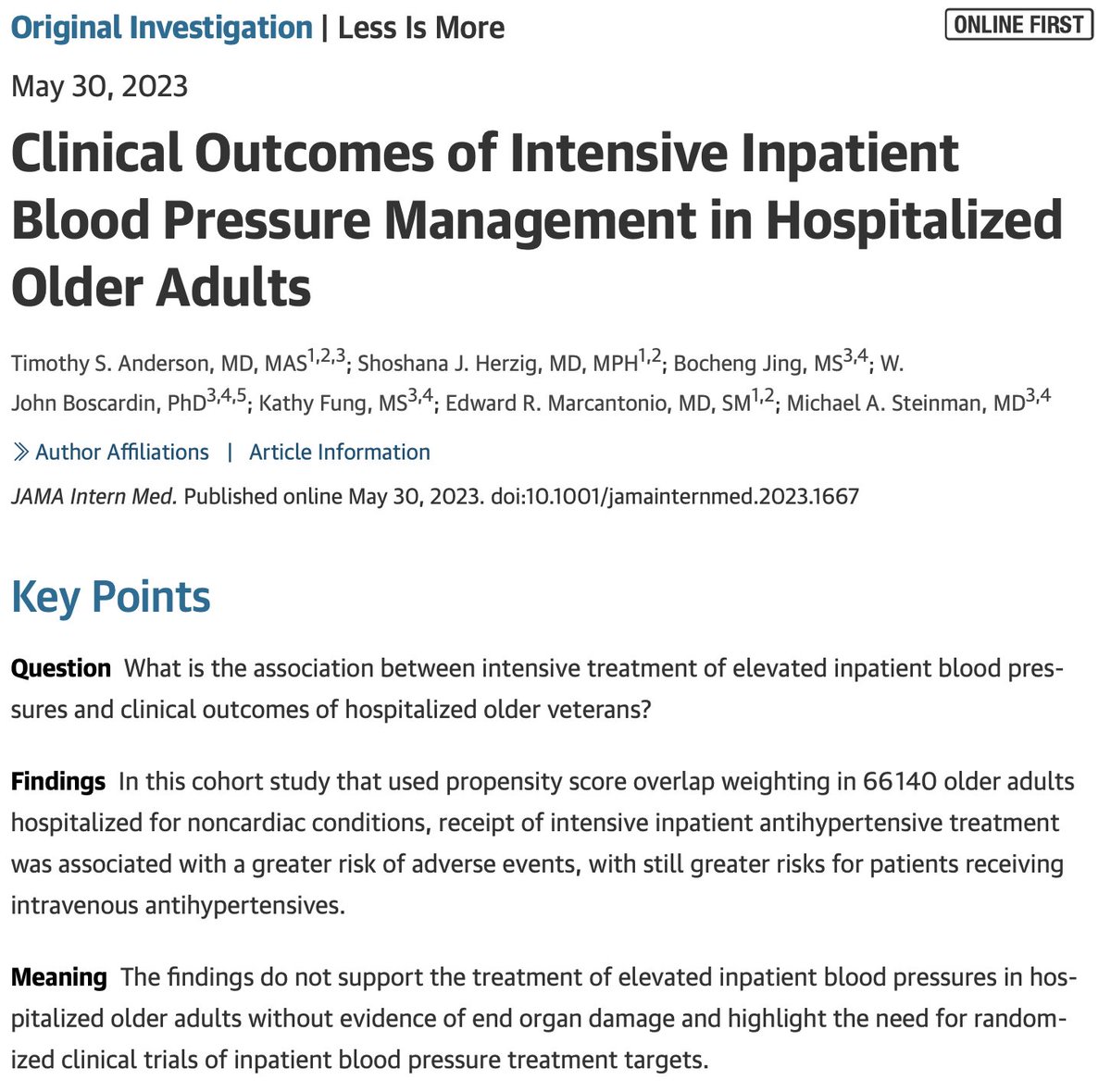
The topic of managing chronic conditions & chronic medications in the hospital is a long-term interest of our group (prescribingwiselylab.org)
Why?
Why?

For starters, we check BP in the hospital all the time!
Mostly in an effort to detect low BPs.
Yet BPs fluctuate & most patients will have some high BPs during a 🏥stay.
Many causes: physiologic stress, meds, poor measurement, true hypertension & so on.
Mostly in an effort to detect low BPs.
Yet BPs fluctuate & most patients will have some high BPs during a 🏥stay.
Many causes: physiologic stress, meds, poor measurement, true hypertension & so on.
1. Ambulatory blood pressure, particularly night-time blood pressure, was found to be more informative about the risk of all-cause death and cardiovascular death than clinic blood pressure.
#MedTwitter #hypertension
doi.org/10.1016/S0140-…
#MedTwitter #hypertension
doi.org/10.1016/S0140-…
2. The conventional method of recording BP is at a clinic. However, that may not be the best way to assess the risk.
Ambulatory BP measurements (both day time and night time) are more valuable in predicting death, as compared to BP measured at a clinic.
Ambulatory BP measurements (both day time and night time) are more valuable in predicting death, as compared to BP measured at a clinic.
3. Night-time ambulatory systolic BP was six times more informative for death than clinic systolic BP and nearly twice as informative as daytime ambulatory systolic BP.
These findings were similar whether patients were treated for hypertension at baseline or not.
These findings were similar whether patients were treated for hypertension at baseline or not.
State of the art: Are #HFpEF phenotypes, a needed classification?
#Hypertension phenotype by Dr. Michele Senni
#HeartFailure2023 @lamcardio @JavedButler1 @JamalRanaMD @AHajduczok @WilfriedMullens @FH_Verbrugge @ShelleyZieroth



#Hypertension phenotype by Dr. Michele Senni
#HeartFailure2023 @lamcardio @JavedButler1 @JamalRanaMD @AHajduczok @WilfriedMullens @FH_Verbrugge @ShelleyZieroth


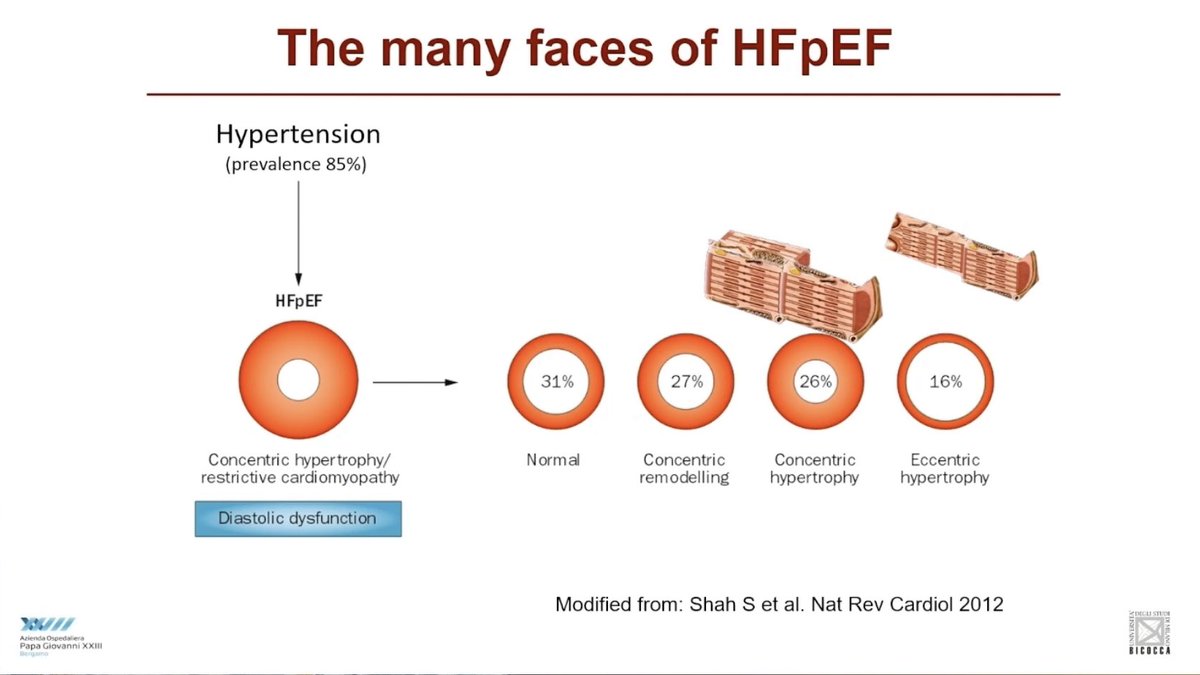

Has #hypertension a greater prognostic impact in HFpEF than #HFrEF?
Should we treat HTN differently in
#HFpEF patients compared to patients without HF?
What are the current evidences ?
#HeartFailure2023



Should we treat HTN differently in
#HFpEF patients compared to patients without HF?
What are the current evidences ?
#HeartFailure2023


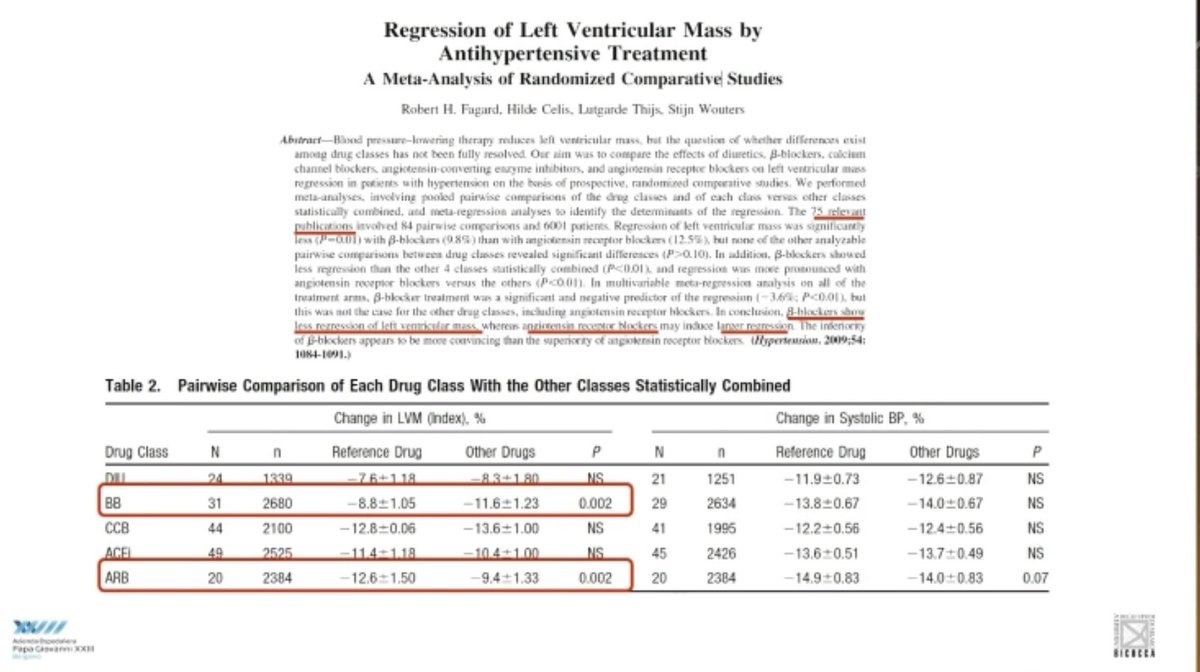

#Spironolactone Use and Improved
Outcomes in Patients With #HFpEF With Resistant #Hypertension
#HeartFailure2023 @escardio
Outcomes in Patients With #HFpEF With Resistant #Hypertension
#HeartFailure2023 @escardio

Packed room with Richard J. Auchus, MD, PhD, FACE on #adrenal #hypertension
- drugs can cause false negative screens but not false positive screens
- you can probably just treat with mineralocorticoid antagonist instead of going through the diagnostic steps
#AACE2023
1/
- drugs can cause false negative screens but not false positive screens
- you can probably just treat with mineralocorticoid antagonist instead of going through the diagnostic steps
#AACE2023
1/

The findings of this one suggest that the glycaemic load of a meal is not a major determinant of postprandial response, with a greater impact exerted by the metabolic health of the individual. 
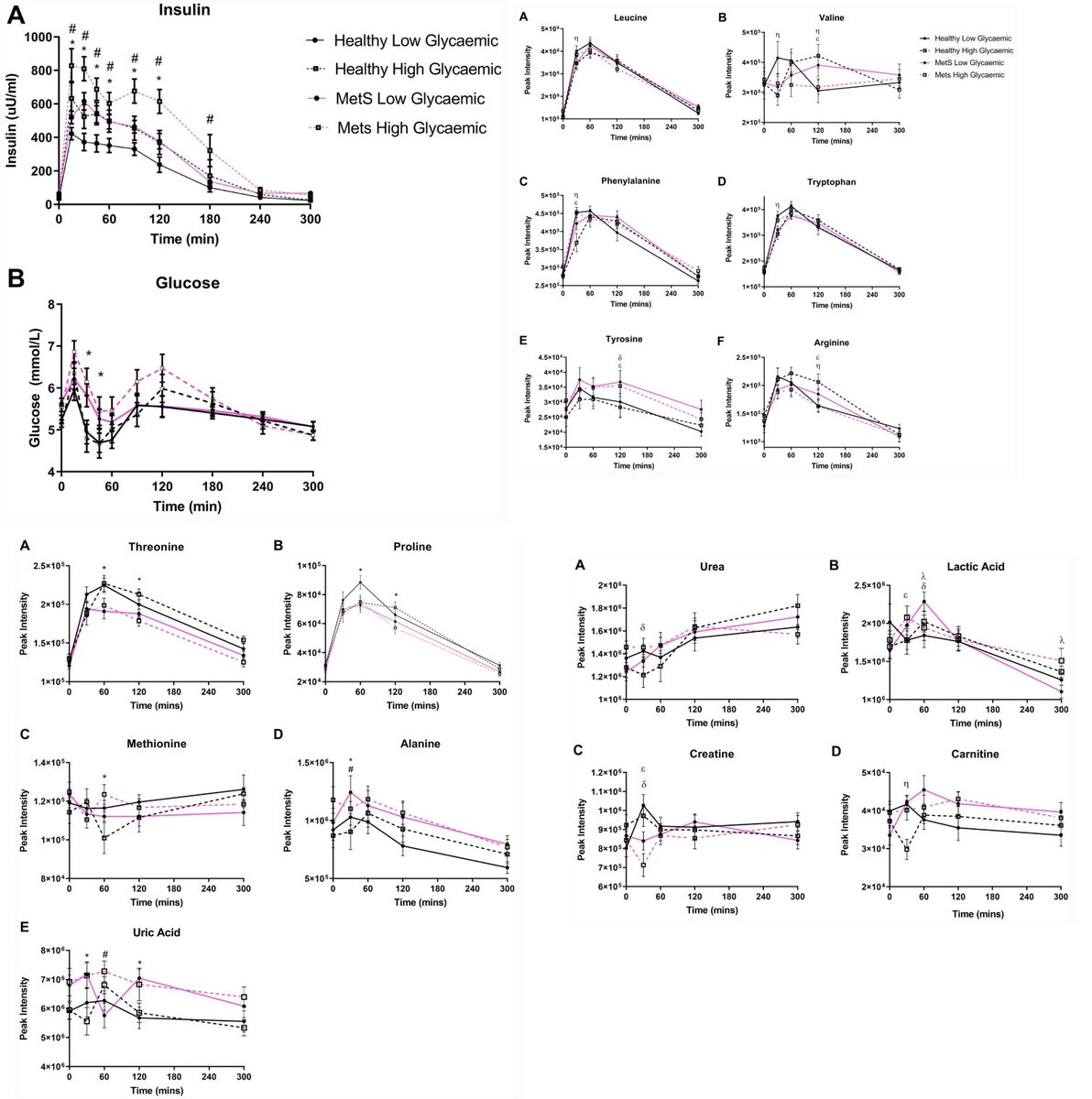
- The aim of this study was to perform an acute cross-over intervention to examine the interactive actions of meal glycaemic load on the dynamic responses of the plasma metabolome in overweight females.
- Postmenopausal women with a mean age of 63 yeras ingested two differing high-carbohydrate test meals (73 g carbohydrate; 51% energy) composed of either low glycemic index or high glycemic index foods in a randomised sequence.
1) Welcome to Part 1 of a new #accredited #tweetorial in our series of educational programs on #hypertrophic #cardiomyopathy #HCM. Previous programs, still available for 🆓CE/#CME, are at cardiometabolic-ce.com/category/hcm/.
Now you can earn another 1.5hr credit by following ALL of this 🧵!
Now you can earn another 1.5hr credit by following ALL of this 🧵!
2) Our expert author is Sergio Kaiser MD PhD FACC FESC 🇧🇷🇮🇱 @pabeda1, cardiologist 🫀, Professor 🎓 of #InternalMedicine, Rio de Janeiro State University. He brings the general cardiologist's perspective to our #HCM discussions. Read and learn!
#FOAMed #CardioTwitter
#FOAMed #CardioTwitter

3) This program is supported by an unrestricted educational grant from Bristol Myers Squibb. Statement of accreditation and faculty disclosures at cardiometabolic-ce.com/disclosures/. Credit for #physicians #nursepractitioners #physicianassociates #nurses #pharmacists from @academiccme.
“The honking of horns and revving of engines doesn’t just affect those in the vehicles — it can also raise the #bloodpressure of people living near the road.” #trafficnoise #noisekills @CityofProv @PVDMayor @PVDCityCouncil @HealthyPVD @Brown_SPH @RIHealth cnn.com/2023/03/22/hea…
“Previous research had shown a connection between road #trafficnoise and an increased risk of #hypertension (#highbloodpressure), but it was still unclear whether it was the #noise or the pollution from the traffic that was the cause. Now, researchers say they have the evidence.”
“The results ... surprised researchers. People living near road #trafficnoise were not only more likely to develop #highbloodpressure, but the risk of this outcome increased with the ‘dose’ of #noise, even when researchers adjusted for fine particles and nitrogen dioxide.”
Contrary to other studies, in this Spanish population with high cardiovascular risk, higher cardiovascular health score using the American Heart Association's Life’s Simple 7 metrics was associated with a decreased risk of incident atrial fibrillation in lean individuals only.
- The American Heart Association’s Life’s Simple 7 health score consists of 7 modifiable metrics: physical activity, diet, smoking status, BMI, systolic blood pressure, fasting plasma glucose, and cholesterol.
1) Welcome to a new #accredited #tweetorial in our series of educational programs on #hypertrophic #cardiomyopathy #HCM. Previous programs, still available for 🆓CE/#CME, are at cardiometabolic-ce.com/category/hcm/.
Now you can earn another 0.75hr credit by following this 🧵!
Now you can earn another 0.75hr credit by following this 🧵!
2) Our expert author is JA Linderbaum MS, ARNP, FACC, FPCNA @jlinderbaum, Associate Professor of Medicine, @MayoClinic, CV #NursePractitioner, Assoc. Medical Editor #AskMayoExpert.
#FOAMed #MedEd @MedTweetorials #CardioTwitter @transformingHC @TNPJ_Journal #cardiology
#FOAMed #MedEd @MedTweetorials #CardioTwitter @transformingHC @TNPJ_Journal #cardiology

3) This program is supported by an unrestricted educational grant from Bristol Myers-Squibb. Statement of accreditation and faculty disclosures at cardiometabolic-ce.com/disclosures/. Credit for #physicians #nursepractitioners #physicianassociates #nurses #pharmacists from @academiccme.
Teaming up again with the great @VerwerftJan to share our experience with #echoCPET in #HFpEF. This hot-of-the-press paper @ESC_Journals demonstrates myriad of opportunities for diagnosis & treatment, far beyond #SGLT2i only. Tweetorial below!
@SarahStroobant2 @HerbotsLieven
@SarahStroobant2 @HerbotsLieven

We have recently described our set-up for a dedicated #dyspnoeaclinic in detail @JACCJournals
In #HFpEF, early & correct diagnosis are important, #phenotyping is everything. There are a lot of mechanisms for dyspnoea involved
In #HFpEF, early & correct diagnosis are important, #phenotyping is everything. There are a lot of mechanisms for dyspnoea involved
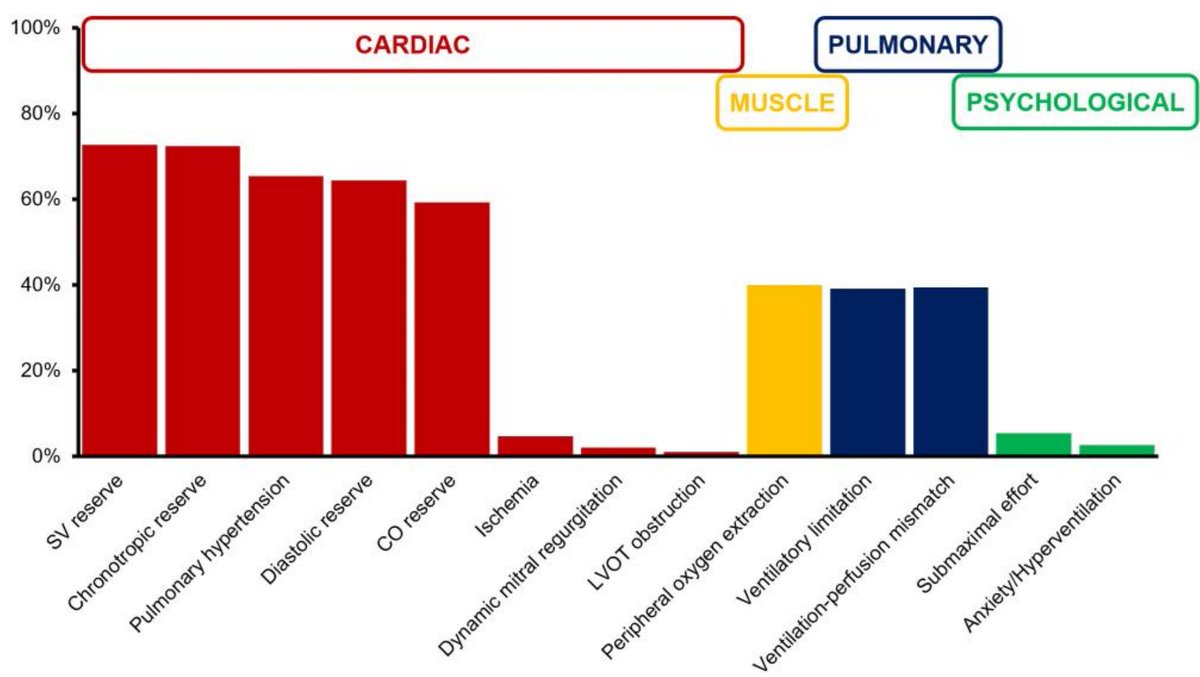
Current @ESC_Journals paper goes one step further: "In patients with confirmed HFpEF or probability >90% according to well-validated HFpEF scores (both are complimentary in our view), why #echoCPET within a dedicated #dyspnoea clinic? What is the impact of findings?" 

"He was very fit Sir"
60y guy. Heart attack 2y ago. Multiple blocks - advised bypass surgery. Didn't get it done. Medication stopped. Took herbal treatment. No follow up with Cardiologist. Now presented with cardiac arrest. Brain dead. What many people think as "fit" - just means… twitter.com/i/web/status/1…
60y guy. Heart attack 2y ago. Multiple blocks - advised bypass surgery. Didn't get it done. Medication stopped. Took herbal treatment. No follow up with Cardiologist. Now presented with cardiac arrest. Brain dead. What many people think as "fit" - just means… twitter.com/i/web/status/1…

So when people say somebody vert fit or apparently healthy died suddenly, I always take it with a pinch of salt because many a times, underlying health conditions existed and were ignored and not taken care of. Commonest being uncontrolled #Diabetes or #hypertension. 


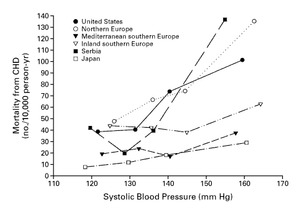
Not all coronary artery disease patients need angioplasty or surgery, but strict control of blood pressure, cholesterol and diabetes becomes super important. Plus regular exercise and diet control. Follow up with a Cardiologist to keep a check needed too on a regular basis.
One of most important articles I’ve done… showing the noise in clinic BP measurement is large & makes it impossible to track Rx effects; almost useless in evaluating change from 2 clinic visits. Let me explain… ahajournals.org/doi/abs/10.116… @YaleMed @YaleCardiology @CircOutcomes 

@YaleMed @YaleCardiology @CircOutcomes But first, kudos to the team @yuan_lu1 @shiwani_mahajan @rohan_khera @SpatzErica @GCLinderman #yuntianliu @jbmortazavi #chenxihuang - great team that persisted on this challenging project. And thanks @CircOutcomes @bnallamo for your support and reviews.
@YaleMed @YaleCardiology @CircOutcomes @yuan_lu1 @shiwani_mahajan @rohan_khera @SpatzErica @GCLinderman @jbmortazavi @bnallamo Now, we often see a patient with hypertension & change the meds and have them return to evaluate Rx effect. If everything goes right, drugs and changing doses may affect BP by ~5 mm Hg. Maybe a little less. We wondered how much natural variability there is between visits.
The prevalence of diabetes and obesity has increased in young adults over the past decade
1. We are witnessing higher numbers of heart attack and stroke in young adults (aged 50 & below). We need to identify the risk factors so that heart attack & stroke can be prevented in them
1. We are witnessing higher numbers of heart attack and stroke in young adults (aged 50 & below). We need to identify the risk factors so that heart attack & stroke can be prevented in them
2. In a recent study, the prevalence of #diabetes increased from 3.0% to 4.1% and #obesity from 32.7% to 40.9% during 2017-20, as compared to 2009-10, among young adults aged 20-44.
9.3% of young adults had #hypertension and 36% had #hyperlipidemia.
jamanetwork.com/journals/jama/…
9.3% of young adults had #hypertension and 36% had #hyperlipidemia.
jamanetwork.com/journals/jama/…
3. Other issue of concern is that most of these young individuals are not aware of their cardiovascular risk factors, with 40-50% of them not on any treatment.
Additionally, among those who receive treatment, 30-40% have poor BP or sugar control.
Additionally, among those who receive treatment, 30-40% have poor BP or sugar control.
Really pleased to share the results of the #LongCovid study I was part of with the Perspectum team out of Oxford University. Using a specialist new technology this focused on assessing multiple organ damage in 'first wave' patients, infected with #COVID in early 2020 or even 2019 

We were given in-depth haemotological tests, respiratory assessments and most importantly whole organ scans using the new 'MRI' type enhanced scanning equipment. My first test showed #myocarditis, three liver #lesions, reduced #kidney function and multiple organ inflammation 



Also in the first year I experienced #TIA, #atrialfibrillation, #septic bursitis, pre-diabetic symptoms, complete loss of taste & smell; hair loss; #polyarthritis joints, abdominal and bone pain plus multiple #infections and skin eruptions Some neuralgia, headaches and brain fog 

In this one, adipsin, an adipokine that can stimulate triglyceride synthesis and is involved in the complement system, was found to be associated with MAFLD.
- Individuals with MAFLD had higher levels of adipsin.
- In indivisuals with MAFLD, as the number of metabolic risk abnormalities increased, the levels of serum adipsin and the proportion of moderate to severe fatty liver disease also increased.
Are you a caring person?
Will you take action to save others from harm?
For example, if you see a child crossing the street on a green traffic light, would you pull them back to prevent them from being hit by a car?
@THiNKX2
1/
Will you take action to save others from harm?
For example, if you see a child crossing the street on a green traffic light, would you pull them back to prevent them from being hit by a car?
@THiNKX2
1/

What will you do when you see thousands of people dying above the average?
Excess deaths: app.powerbi.com/view?r=eyJrIjo…
@THiNKX2
2/
Excess deaths: app.powerbi.com/view?r=eyJrIjo…
@THiNKX2
2/

LIVE: Opening of 152nd WHO Executive Board meeting twitter.com/i/broadcasts/1…
"Three years ago today, I declared a public health emergency of international concern over the global spread of #COVID19 – the highest level of alarm under the International Health Regulations, and for the moment, the only level of alarm"-@DrTedros #EB152


@DrTedros "As you know, on Friday the Emergency Committee met to consider whether that remains the case. The committee has advised me that in its view, #COVID19 remains a global health emergency, and I agree"-@DrTedros #EB152 bit.ly/3JtgqhJ
Does habitual #Coffee consumption increase the blood pressure (BP)?
1. Coffee is the most widely consumed drink (after water) and coffee lovers need clarity whether it is safe in all aspects. Does it raise the BP? Is coffee safe for people with hypertension (high BP)? Let us see
1. Coffee is the most widely consumed drink (after water) and coffee lovers need clarity whether it is safe in all aspects. Does it raise the BP? Is coffee safe for people with hypertension (high BP)? Let us see
2. No added risk of high BP
The results of numerous studies and meta-analyses indicate that "moderate and habitual coffee consumption does not increase" and may even reduce the risk of developing arterial #hypertension.
doi.org/10.1007/s11906…
The results of numerous studies and meta-analyses indicate that "moderate and habitual coffee consumption does not increase" and may even reduce the risk of developing arterial #hypertension.
doi.org/10.1007/s11906…
3. Coffee can be safely consumed by people with high BP
Moderate "habitual coffee consumption in hypertensive persons does not increase the risk of uncontrolled blood pressure" and may even reduce the risk of death from any cause.
Moderate "habitual coffee consumption in hypertensive persons does not increase the risk of uncontrolled blood pressure" and may even reduce the risk of death from any cause.
The darker side of dark chocolates
1. Dark chocolates are popular due to their potential health benefits (they are rich in anti-oxidants and are good for heart) and moreover, they are low in sugar content. >50% consider them as safer and healthier option (as compared to candies)
1. Dark chocolates are popular due to their potential health benefits (they are rich in anti-oxidants and are good for heart) and moreover, they are low in sugar content. >50% consider them as safer and healthier option (as compared to candies)
2. But there’s a dark side to this “healthier” #chocolate. Research has found that some dark chocolate bars contain cadmium and lead—two heavy metals linked to a host of health problems.
Consumer report scientists detected cadmium & lead in many dark chocolate samples tested.
Consumer report scientists detected cadmium & lead in many dark chocolate samples tested.
3. Consistent, long-term exposure to even small amounts of heavy metals can lead to a variety of #Health problems. The danger is greatest for #pregnantwomen and young #Children because the metals can cause developmental problems, affect #brain development, and lead to lower IQ.
Here, both metabolically healthy and metabolically unhealthy obesity were associated with higher risk of cancer, although though the risk relationships were weaker in the latter case.
- The combination of obesity and metabolically unhealthy status conveyed the highest risk of any obesity-related cancer, compared to other combinations of BMI and metabolic health status.
- The increased risk was found for most obesity-related cancers, with the highest relative risks found for endometrial, liver, and renal cell cancer.
This one delves further into the cardiometabolic impact of body fat distribution, finding associations between visceral, abdominal subcutaneous, and gluteofemoral adipose tissue volumes at scale and risk of type 2 diabetes, and coronary artery disease. 

This is not the first study of this group in this subject. They have done some previous, related, and very interesting work on the matter:
- The intention was to quantify visceral, abdominal subcutaneous, and gluteofemoral adipose tissue volumes at scale using machine learning and data from the studies mentioned above, in order to determine associations with type 2 diabetes and coronary artery disease.
Here, total intakes of folate, vitamin B6, and vitamin B12 were inversely associated with the incidence of meatbolic syndrome and the majority of its individual components among adults in the US. 

- Folate intake was inversely associated with all of the individual components of the metabolic syndrome.
- The inverse association between vitamin B6 and metabolic syndrome appeared to be mainly explained by its favorable outcomes on adiposity, hypertriglyceridemia, low HDL-C, and elevated blood pressure.


